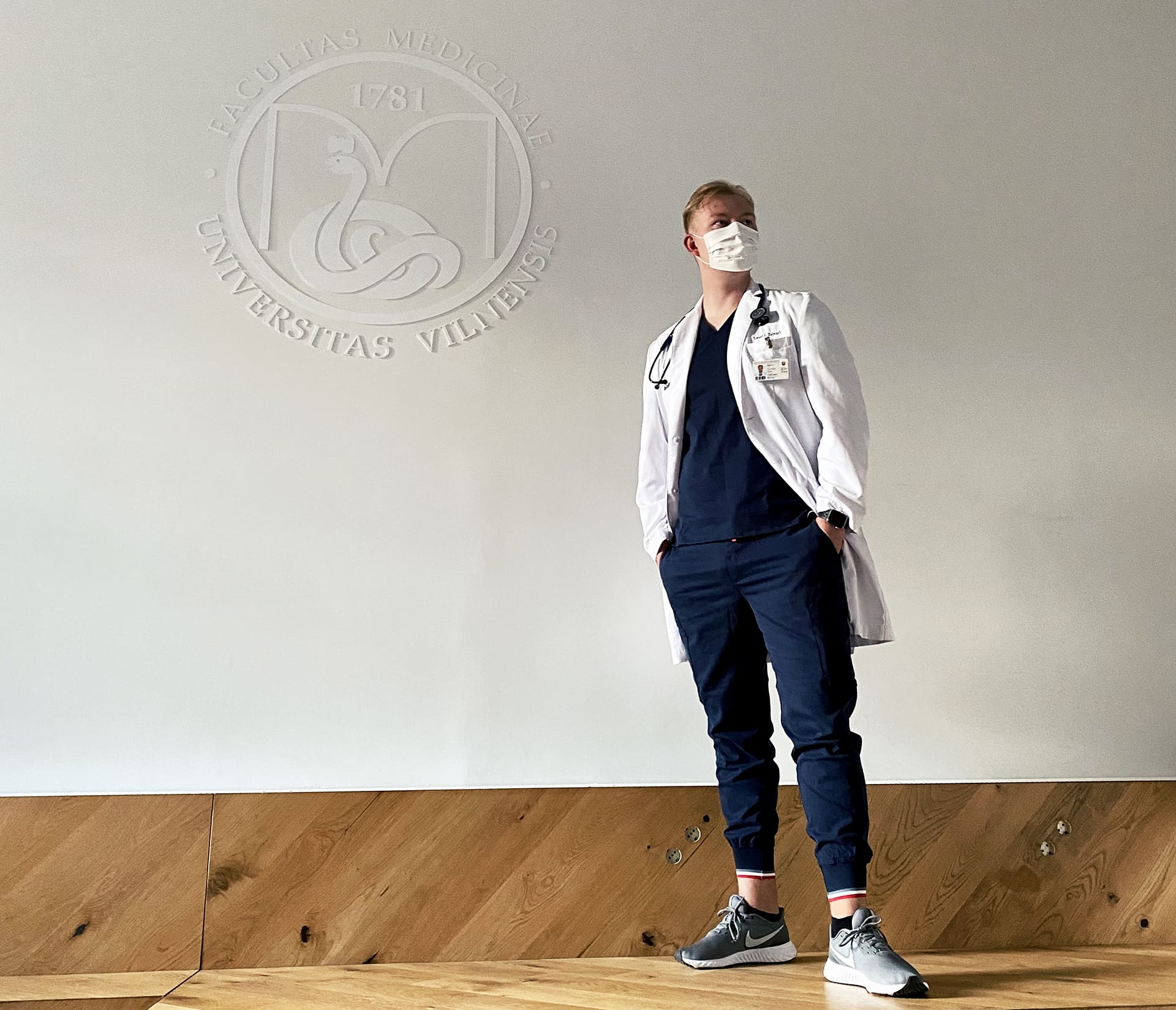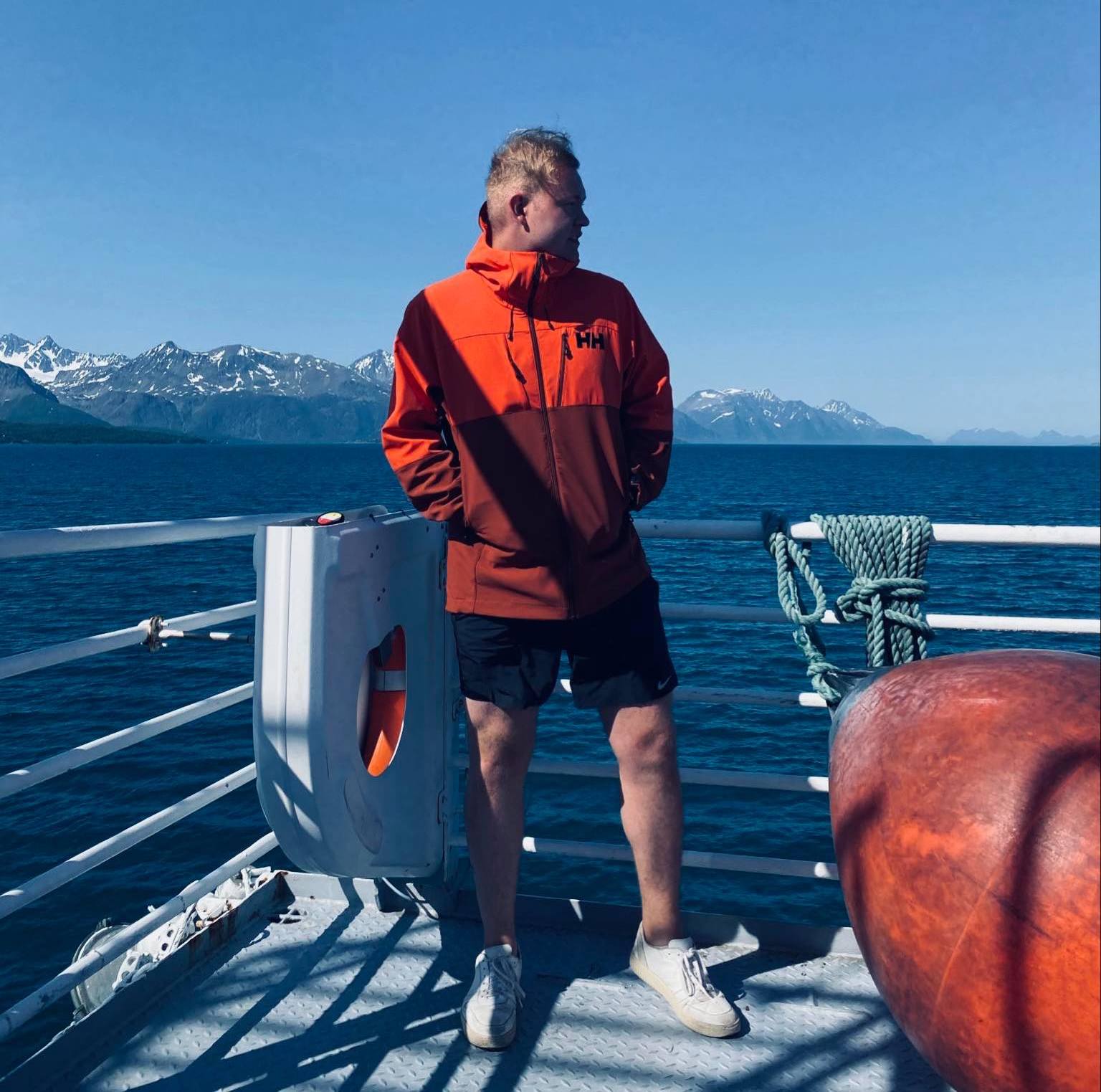 Lauri Toivari. Photo from Lauri Toivari's archive
Lauri Toivari. Photo from Lauri Toivari's archive
“I had heard so many good things about Vilnius University. When I did comparison, I also found that Vilnius University is the most internationally renowned of the Baltic schools,” says medical student Lauri Toivari during the interview with the Finnish news portal YLE.
What led the student to choose studies abroad? What is the difference between the study culture in Finland and Lithuania? And finally, what surprises he face in Lithuania? Answers to these questions in the YLE article below.
The aim is to study abroad
The number of Finns studying medicine abroad has multiplied in ten years. People go abroad because of the international atmosphere or because they were unable to gain admission in Finland. People changing fields also often go abroad.
The exchange students at Tampere Classical High School had a revolutionary impact on Lauri Toivari's life. Thanks to them, Toivari began to think about going abroad to study. Another important spark was his participation in an international research camp in South Africa. “I have wanted to be a doctor since I was a little boy, but not by following in the footsteps of my doctor parents. I thought, why study in Finland when I could study in English in an international environment,” says Toivari, now 20.
So right after high school, Toivari went to study medicine at Vilnius University in Lithuania, where he is now in his second year. Finding a place to study required a lot of personal initiative and asking friends. In the end, he applied to four universities, only two were dropped from the shortlist due to the Brexit. The final shortlist included the Netherlands and Lithuania. He was admitted to Vilnius University in Lithuania in spring 2020. “I had heard so many good things about Vilnius University. When I did comparison, I also found that Vilnius University is the most internationally renowned of the Baltic schools,” he said.
More than 1 200 Finns study abroad to become doctors
Last academic year, there were 1 198 Finnish medical students abroad receiving study grants. As not all of them receive financial aid, the number of students can be estimated at just over 1 200. According to Lääkärilehti (www.laakarilehti.fi), the most popular country to study in is Latvia. Sweden and Romania come next.
Piitu Parmanne, a labour market researcher at the Medical Association, believes that Latvia's popularity is partly due to its good reputation. “There are many students from Sweden, Norway, and Germany. Word has got around that it has a good education and an international feel. There are also good transport connections from Finland. The fact that it is no longer as easy to study in Sweden with a Finnish matriculation certificate as it used to be may also make the country more popular,” says Parmanne.
The Finnish Medical Association regularly surveys students studying abroad. In its surveys, the Federation has identified three different groups of students who go abroad. Lauri Toivari belongs to the group that values internationality, studying in English and a possible career abroad.
Then there is a large group of those who have tried to study medicine in Finland but have not been accepted. “The third group are career changers. They have been in another profession before and still want to become doctors. Long preparation for the entrance exams or uncertainty about admission in Finland has contributed to their departure. They want to progress quickly,” says Parmanne.
 Lauri Toivari. Photo from Lauri Toivari's archive
Lauri Toivari. Photo from Lauri Toivari's archive
Admission required passed exams, a motivation letter and good grades
The price of a foreign degree varies a lot. In the Nordic countries, studying is free, but in the Baltic countries, for example, a year of study costs between €5 000 and €11 000. Lauri Toivari's year is at the top end of the price scale, at €11 000.
Toivari receives a study grant and a housing allowance from Finland, which is the same for all students studying abroad - €210. The student loan is slightly more than in Finland, €800 a month. If getting into medical school is difficult in Finland, it doesn't sound easy elsewhere.
There is no actual entrance exam to Vilnius University, but applicants are interviewed. They are also required to write a motivation letter, a letter of recommendation from a teacher, for example, a pass in the SAT in biology or chemistry and a pass in the IELTS test in English. Grades from the school leaving examination and the school leaving certificate will also be considered.
Toivari has been very satisfied with the education he has received. The teachers are not very different from those in Finland, but the culture of studying is a little different. “In Finland, perhaps the student is given more responsibility. In Lithuania there is more compulsory attendance. Weeks consist of lectures, seminars, and lab classes. Lectures are usually recorded, which allows you to watch them online at your own convenience,” he said.
The Covid era also changed the way of study in Lithuania, where all of Toivari's studies, including lab lessons, went online. Now it's back to a hybrid model.
The qualification is valid as such in Finland
A medical degree obtained in an EU country is valid in Finland as such, but you must obtain a licence from Valvira to practice the profession. Traineeships can also be carried out in Finland or in any other EU country. Lauri Toivari has not yet had a compulsory traineeship, but last summer he worked in Pirkanmaa as a coronary sampler and in a laboratory taking ECG samples.
The last year of his studies, the sixth, is entirely devoted to working as a doctor, and you can do that anywhere in the EU. “I have not yet decided where I will do my traineeships or where I will settle down after my studies. I could probably go back to Finland, but on the other hand, I studied at an international school, so I want to keep all options open. For example, I'm interested in Norway and Netherlands as a place for internships and specialization,” he said.
When the Finnish Medical Association asked people who had studied abroad about their willingness to return to work in Finland, more than half said they would come back immediately after their studies. The other half were certain, but still wanted to explore other options. Only 1-3% said they did not intend to return to Finland at all.
 Lauri Toivari. Photo from Lauri Toivari's archive
Lauri Toivari. Photo from Lauri Toivari's archive
Lithuania has surprised: milk is expensive, Vilnius is amazingly clean
For the first year, Toivari lived in a shared flat with another Finn. Now he has a 40 square metre apartment right next to the university. The living expenses are just over 600 euros per month. According to Toivari, life is mostly cheaper than in her home country. Food, gym, cinema and theatre are much cheaper than in Finland. But some individual things may surprise you: milk, for example, is much more expensive than in Finland.
Toivari has not experienced any culture shock, but a few things have surprised him. One is that English is not widely spoken in Lithuanian government institutions. When he was hospitalised with food poisoning, an interpreter had to be called in. Toivari is learning Lithuanian to cope better with local patients at the clinic.
“A positive surprise was how clean Vilnius is. I had preconceived notions that this was a Soviet-era country, but Vilnius is cleaner than Helsinki or Tampere. There are no drunks or drug addicts”.
Video call helps when homesickness strikes
There are 11 Finns in Toivari's year group. When all year groups are counted, there are 40-50 Finnish medical students in Vilnius. They have a variety of activities in their own candi society, but of course the coronation period has slowed down the dinners and other events. “If I get homesick, I can make a Facetime call home or to friends. I also follow the Finnish news. You don't always realise you're living in another country”.
He wants to advise those who dream of studying abroad to make an effort to learn English and also advises people to believe in themselves: “Focus on your goal. If it's studying abroad, aim for it. Family and friends will stay in Finland, but don't let that stop you, because you'll make lots of new friends and have new experiences abroad”.
